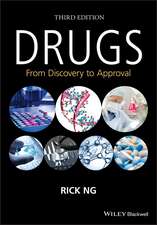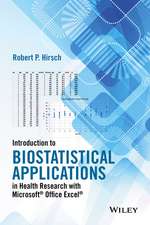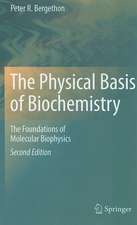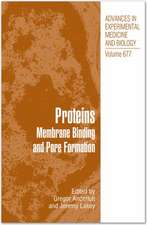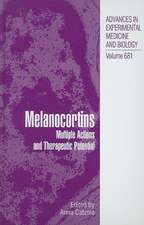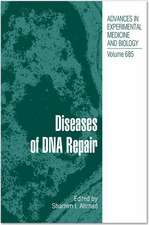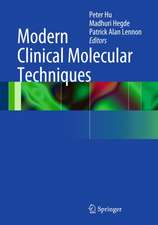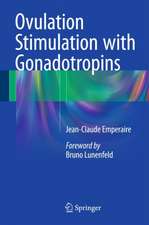MIPs and Their Roles in the Exchange of Metalloids: Advances in Experimental Medicine and Biology, cartea 679
Editat de Thomas P. Jahn, Gerd P. Bienerten Limba Engleză Paperback – 23 aug 2016
| Toate formatele și edițiile | Preț | Express |
|---|---|---|
| Paperback (1) | 968.09 lei 39-44 zile | |
| Springer – 23 aug 2016 | 968.09 lei 39-44 zile | |
| Hardback (1) | 1094.80 lei 3-5 săpt. | |
| Springer – 5 mai 2010 | 1094.80 lei 3-5 săpt. |
Din seria Advances in Experimental Medicine and Biology
- 9%
 Preț: 719.60 lei
Preț: 719.60 lei - 20%
 Preț: 691.93 lei
Preț: 691.93 lei - 5%
 Preț: 717.00 lei
Preț: 717.00 lei - 5%
 Preț: 716.28 lei
Preț: 716.28 lei - 5%
 Preț: 717.20 lei
Preț: 717.20 lei - 15%
 Preț: 640.24 lei
Preț: 640.24 lei - 5%
 Preț: 1113.83 lei
Preț: 1113.83 lei - 5%
 Preț: 715.71 lei
Preț: 715.71 lei - 5%
 Preț: 820.43 lei
Preț: 820.43 lei - 15%
 Preț: 641.38 lei
Preț: 641.38 lei - 5%
 Preț: 716.28 lei
Preț: 716.28 lei - 5%
 Preț: 523.99 lei
Preț: 523.99 lei - 5%
 Preț: 1031.00 lei
Preț: 1031.00 lei - 5%
 Preț: 717.00 lei
Preț: 717.00 lei - 5%
 Preț: 715.35 lei
Preț: 715.35 lei - 20%
 Preț: 1161.71 lei
Preț: 1161.71 lei - 5%
 Preț: 1170.51 lei
Preț: 1170.51 lei - 18%
 Preț: 1119.87 lei
Preț: 1119.87 lei - 5%
 Preț: 1288.48 lei
Preț: 1288.48 lei - 5%
 Preț: 1164.67 lei
Preț: 1164.67 lei - 5%
 Preț: 1101.73 lei
Preț: 1101.73 lei - 18%
 Preț: 1123.67 lei
Preț: 1123.67 lei - 5%
 Preț: 1435.64 lei
Preț: 1435.64 lei - 20%
 Preț: 1044.10 lei
Preț: 1044.10 lei - 18%
 Preț: 946.39 lei
Preț: 946.39 lei - 5%
 Preț: 292.57 lei
Preț: 292.57 lei - 18%
 Preț: 957.62 lei
Preț: 957.62 lei - 18%
 Preț: 1235.76 lei
Preț: 1235.76 lei - 5%
 Preț: 1231.55 lei
Preț: 1231.55 lei - 5%
 Preț: 1292.30 lei
Preț: 1292.30 lei - 5%
 Preț: 1102.10 lei
Preț: 1102.10 lei - 18%
 Preț: 1132.81 lei
Preț: 1132.81 lei - 5%
 Preț: 1165.19 lei
Preț: 1165.19 lei - 5%
 Preț: 1418.48 lei
Preț: 1418.48 lei - 5%
 Preț: 1305.63 lei
Preț: 1305.63 lei - 18%
 Preț: 1417.72 lei
Preț: 1417.72 lei - 18%
 Preț: 1412.99 lei
Preț: 1412.99 lei - 24%
 Preț: 806.16 lei
Preț: 806.16 lei - 18%
 Preț: 1243.29 lei
Preț: 1243.29 lei - 5%
 Preț: 1429.44 lei
Preț: 1429.44 lei - 5%
 Preț: 1618.70 lei
Preț: 1618.70 lei - 5%
 Preț: 1305.12 lei
Preț: 1305.12 lei - 18%
 Preț: 1124.92 lei
Preț: 1124.92 lei - 5%
 Preț: 1097.54 lei
Preț: 1097.54 lei - 15%
 Preț: 649.87 lei
Preț: 649.87 lei - 5%
 Preț: 1097.54 lei
Preț: 1097.54 lei - 18%
 Preț: 945.79 lei
Preț: 945.79 lei - 5%
 Preț: 1123.16 lei
Preț: 1123.16 lei
Preț: 968.09 lei
Preț vechi: 1019.05 lei
-5% Nou
Puncte Express: 1452
Preț estimativ în valută:
185.25€ • 202.03$ • 156.20£
185.25€ • 202.03$ • 156.20£
Carte tipărită la comandă
Livrare economică 21-26 aprilie
Preluare comenzi: 021 569.72.76
Specificații
ISBN-13: 9781493941001
ISBN-10: 1493941003
Pagini: 145
Ilustrații: XVI, 145 p.
Dimensiuni: 170 x 244 mm
Ediția:2010
Editura: Springer
Colecția Springer
Seria Advances in Experimental Medicine and Biology
Locul publicării:New York, NY, United States
ISBN-10: 1493941003
Pagini: 145
Ilustrații: XVI, 145 p.
Dimensiuni: 170 x 244 mm
Ediția:2010
Editura: Springer
Colecția Springer
Seria Advances in Experimental Medicine and Biology
Locul publicării:New York, NY, United States
Cuprins
Aquaporins: A Family of Highly Regulated Multifunctional Channels.- Phylogeny of Major Intrinsic Proteins.- Metalloids, Soil Chemistry and the Environment.- Arsenic Transport in Prokaryotes and Eukaryotic Microbes.- Metalloid Transport by Aquaglyceroporins: Consequences in the Treatment of Human Diseases.- Roles of Vertebrate Aquaglyceroporins in Arsenic Transport and Detoxification.- Molecular Mechanisms of Boron Transport in Plants: Involvement of Arabidopsis NIP5;1 and NIP6;1.- Silicon Transporters in Higher Plants.- Major Intrinsic Proteins and Arsenic Transport in Plants: New Players and Their Potential Role.- Major Intrinsic Proteins in Biomimetic Membranes.
Notă biografică
Thomas P. Jahn is an Associate Professor and group leader at the Department of Agriculture and Ecology, Faculty of Life Sciences, University of Copenhagen. He studied biology at the University of Bonn, Germany. From early on in his scientific career he was interested in transport processes in plants and the molecular mechanisms behind these processes. More recently his group contributed to the field of aquaporin research culminating in the identification of several new substrates for members of this superfamily of channel proteins.The overall scope of his current research focuses on the elucidation of networks comprising molecular components engaged in the responses to nutritional stresses, including elements of transport, assimilation, storage and stress signaling.Gerd P. Bienert is currently a Marie Curie Fellow at the Institute of Life Science at the Université Catholique de Louvain in Louvain la Neuve, Belgium. His work focuses on the molecular characterisation of the intracellular trafficking and hetero‑oligomerisation of aquaporins in plants. In 2008, he received his PhD in Molecular Plant Nutrition from the University of Copenhagen, Denmark. During his PhD, Gerd Patrick Bienert made significant advances in the scientific understanding on the substrate selectivity of plant aquaporins for uncharged solutes. The work resulted in the molecular identification of the first arsenite, antimonite and hydrogen peroxide channels in plants.Gerd P. Bienert studied biology at the Julius‑Maximilians‑University Würzburg and at the Technical University Darmstadt, Germany. During his education he emphasized molecular plant physiology and biophysics, genetics and biotechnology. His main research interests focus on the molecular transmembrane transport processes involved in the uptake, translocation and extrusion of compounds that are relevant for plant physiology. In addition, intracellular regulation and trafficking of the transport proteins themselves are alsocontemplated.In his home region, Tauber‑Franken, he began to develop his enthusiastic curiosity for biology by exploring and studying nature. He became fascinated by insects, especially the members of the order of hymenoptera to which he still devotes his free‑time.The existing overlap between entomology and botany has aroused his interest in understanding the physiology of plants.
Caracteristici
Dedicated to the metalloids, a recently discovered group of substrates for a number of specific MIPs in a diverse spectrum of organisms Aspects of the environmental chemistry of metalloids relevant to understand the role of MIPs in the exchange of metalloids between organisms and their environment Recent advances that have changed our view on how transport of metalloids through these MIPs is integrated into a network of molecular players including metabolic enzymes

